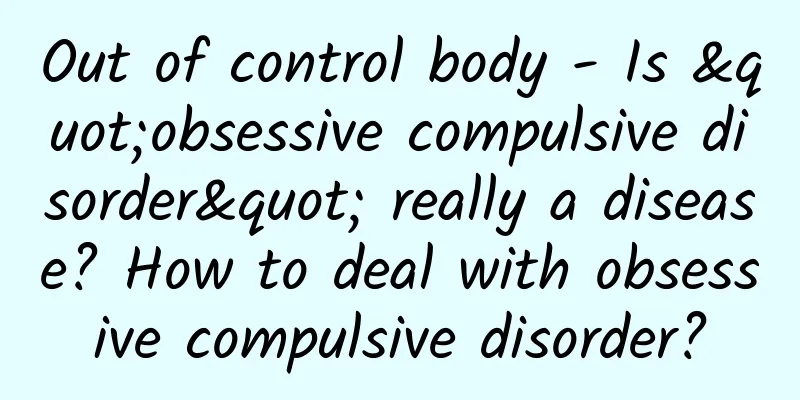Out of control body - Is "obsessive compulsive disorder" really a disease? How to deal with obsessive compulsive disorder?

|
Author: Xu Wei, Zhongda Hospital Affiliated to Southeast University Reviewer: Dong Liping, Chief Physician, Subei People's Hospital, Jiangsu Province 1. What is obsessive-compulsive disorder? Is your brain out of control, with recurring unwanted thoughts or images? Does it cause you mental anxiety and pain? Do you feel driven to perform specific behaviors or mental activities repeatedly? Perform the following behaviors. 1. Cleaning Repeated washing of hands, bathing, or cleaning of household items, usually for several hours. 2. Check Check and recheck every day that the door is locked, the coffee machine is turned off, the hair dryer is unplugged, etc. 3. Repetition: Inability to stop repeating a name, phrase, or simple activity (e.g., walking through a doorway over and over). 4. Hoarding Having difficulty discarding useless items, such as old newspapers or magazines, bottle caps, or rubber bands. 5. Touching and arranging must be precise and neat, and objects must be placed in a certain order; when climbing stairs, the steps corresponding to the left and right feet must follow the rules of odd and even numbers. 6. Mental Activities Endlessly reviewing conversations, counting or praying, and using special words or phrases. Figure 1 Copyright image, no permission to reprint If you experience any of the above symptoms, you may be suffering from obsessive-compulsive disorder. Some people may have obsessions and/or compulsions at some point in their lives, but this does not mean they have OCD. To make a more accurate diagnosis, it is important to determine whether the cycle of obsessions and/or compulsions is very typical. Usually, obsessions and/or compulsions consume a lot of time (lasting at least 1 hour per day), cause intense distress to the person, or interfere with important activities and relationships. In addition, obsessive-compulsive symptoms may not be obvious to be observed. Some successful people in society may be silently fighting against obsessive-compulsive disorder and are afraid to let others know. It is difficult for people with obsessive-compulsive disorder to stop self-criticism, and they are always trapped in the identity of perfectionists. Some people with obsessive-compulsive disorder appear to behave normally on the surface, but they are constantly struggling, distressed, and talking to themselves in their hearts. "I feel like I have obsessive thoughts and compulsive behaviors sometimes, but I think normal people also have these symptoms, just not as severe, right?" The characteristics of obsessive-compulsive symptoms in normal people are: ① They are short-lived and sometimes present and sometimes absent; ② They are mild and do not affect normal life and work; ③ They do not take the initiative to restrain those obsessive-compulsive symptoms. The obsessive-compulsive symptoms of patients with OCD are: ① more frequent (more than 1 hour per day on average); ② more intense (seriously affecting study and life); ③ more distressing and anxious (weakening various psychological functions). As a common mental illness among young people, obsessive-compulsive disorder not only causes patients to suffer from the disease, but also brings great pain to their families. Some families have fallen apart because of obsessive-compulsive disorder. A real case in the clinic: parents live with their son who suffers from obsessive-compulsive disorder. For the parents, it is a "hellish" feeling. The son controls and interferes with everything in the parents' lives. For example, they must clean or wash vegetables according to the steps he stipulates; they must cut vegetables into a certain shape according to his requirements; they must step into the house with their right foot first, otherwise they must close the door again and step into the house again in the way he requires; items must be placed neatly or in the same direction, otherwise the patient will be very angry; "garbage" such as old newspapers or empty food containers must be piled up; when going out to throw away garbage, the faucet must be kept open, because if you turn on the faucet after returning home after throwing away the garbage, the faucet will be contaminated... Therefore, it is necessary for the family members of patients with OCD to learn to get along with the patients while actively supporting their treatment. Obsessive-compulsive disorder is not formed overnight. It takes time to change the patient's relatively fixed thinking, emotional and behavioral coping patterns. Therefore, the doctor should ask the patient, "Do you really want to get better? What kind of life do you want to live?" "In order to live the life you want, are you really ready to make changes to your obsessive-compulsive disorder?" "What can you do now?" After clarifying these questions, take action. Treatment of obsessive-compulsive disorder 1. Cognitive behavioral therapy Exposure therapy and ritual (response) prevention therapy are cognitive behavioral therapies that are effective in treating obsessive-compulsive disorder. Exposure therapy involves gradually and repeatedly exposing patients to things (scenes or people) that trigger obsessive thoughts, rituals, or discomfort, while requiring patients not to perform compulsive rituals (ritual prevention therapy). Through repeated exposure therapy, the patient's discomfort or anxiety can gradually disappear, allowing the patient to understand that their compulsive behavior is unnecessary to reduce the discomfort caused by the obsessions. Usually, the therapist and the patient work together to develop an exposure therapy plan, and the treatment should be gradual. Exposure therapy can be performed in the hospital or at home. 2. Medication Selective serotonin reuptake inhibitors are effective in treating obsessive-compulsive disorder, and physicians can choose them based on the patient's sensitivity to the drug. Other psychiatric drugs may also be effective and should be used as directed by the physician. For patients with mild to moderate obsessive-compulsive symptoms, cognitive behavioral therapy or drug therapy is usually given based on the patient's preference, the patient's cognitive ability and insight level, other comorbid psychiatric disorders, and the availability of treatment. It is recommended that patients with severe obsessive-compulsive symptoms receive both cognitive behavioral therapy and drug therapy. 3. Support from family or caregivers For patients with OCD who live with family members or caregivers, it is recommended to seek support from family members or caregivers. Family members or caregivers can help patients practice exposure therapy at home. 4. Self-care Maintaining a healthy lifestyle can help you cope with OCD. In addition, using basic relaxation techniques such as meditation, yoga, visualization, and massage can relieve the stress and anxiety caused by OCD. |
<<: "Evolution" or "evolution"? The key lies in scale
Recommend
Promotion and marketing: How to better realize product copywriting dissemination?
How to better disseminate information/products? T...
Mini Program User Growth Point!
The mobile Internet has entered the stock market,...
What are the functions of the Foshan education and training institution mini program? How much does it cost to develop a small program for educational institution management?
We are actively pursuing our careers to the next ...
A complete collection of free and paid APP promotion methods, this may be the most comprehensive collection of promotion channels!
Why are your advertising dollars always wasted? W...
Video account sales bonus project, complete tutorial from getting started to placing orders
Video account sales bonus project, complete tutor...
Video tutorial on techniques and methods for shooting short videos
Nowadays, many people find that as long as the sh...
App facing difficulties? ! Let’s gamify your product
As a typical representative of Internet products,...
New brand Xiaohongshu content marketing? 28 suggestions!
Is there any shortcut to marketing on Xiaohongshu...
World Thyroid Day | As the saying goes, “Anger harms the body”, are thyroid nodules really caused by anger?
□ Gao Hongkai May 25th is World Thyroid Day. The ...
Baidu promotion Juping advertising delivery mode, targeting method, and selling price!
1. Delivery 1) What are the different modes of Ju...
2020 Suntech Financial Management Full Tutorial
2020 Suntech Financial Management Full Tutorial 1...
How to monetize short videos of investment and franchising type?
Have you ever encountered such accounts when watc...
Lan Guilian and Lan Ziyun's illustration training camp will end in April 2021 [HD quality with materials]
Lan Guilian and Lan Ziyun's illustration trai...
The turtle tested positive for cholera! Can we still eat and drink it safely? !
On the evening of July 9 this year, the Wuchang D...
Looking back at the past decade of iPhone suppliers: some made a lot of money, while others lost a lot
According to foreign media reports, Nikkei Asian ...



![[Popular Science of Chinese Military Technology] Do the rapidly evolving humanoid robots dream of going to the battlefield?](/upload/images/67f23e973f6ce.webp)





